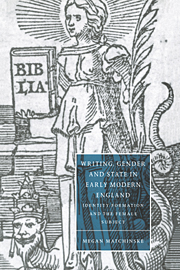Book contents
- Frontmatter
- Contents
- Acknowledgments
- Introduction
- 1 Resistance, Reformation, and the remaining narratives
- 2 Framing recusant identity in Counter-Reformation England
- 3 Legislating morality in the marriage market
- 4 Gender formation in English apocalyptic writing
- 5 Connections, qualifications, and agendas
- Notes
- Bibliography
- Index
- Cambridge Studies in Renaissance Literature and Culture
Introduction
Published online by Cambridge University Press: 23 October 2009
- Frontmatter
- Contents
- Acknowledgments
- Introduction
- 1 Resistance, Reformation, and the remaining narratives
- 2 Framing recusant identity in Counter-Reformation England
- 3 Legislating morality in the marriage market
- 4 Gender formation in English apocalyptic writing
- 5 Connections, qualifications, and agendas
- Notes
- Bibliography
- Index
- Cambridge Studies in Renaissance Literature and Culture
Summary
Margaret Cavendish, first Duchess of Newcastle, opens her memoir by recounting a crisis of conscience she faced in her courtly duties at Oxford in the early years of the English Civil War. She writes:
My brothers and sisters seemed not very well pleased [with my mother's decision to allow me to wait upon the Queen at Oxford], by reason I had never been from home … for though they knew I would not behave myself to their … dishonour, yet they thought I might to my disadvantage, being very unexperienced in the world … [As a result of their warnings and because] I had heard the world was apt to lay aspersions even on the innocent … I durst neither look up with my eyes, nor speak, nor be any way sociable: insomuch as I was thought a natural fool … And indeed I was so afraid to dishonour my friends and family by my indiscreet actions, that I rather chose to be accounted a fool, than to be thought rude or wanton. In truth, my bashfulness and fears made me repent my going from home to see the world abroad.
In these lines, Cavendish reminds her readers that her demeanor at court depends on several things.
- Type
- Chapter
- Information
- Writing, Gender and State in Early Modern EnglandIdentity Formation and the Female Subject, pp. 1 - 23Publisher: Cambridge University PressPrint publication year: 1998



